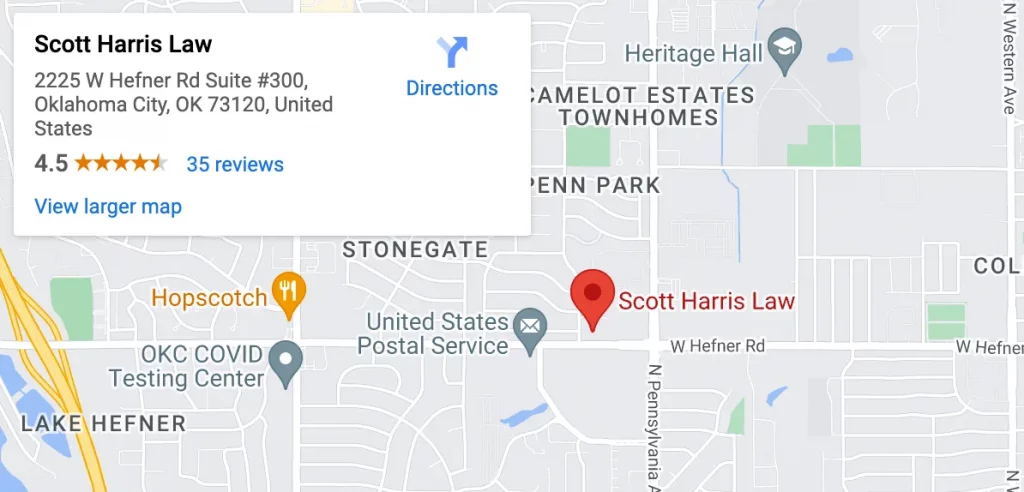Get Personalized Solutions Now!
Like any other state, Oklahoma has set exemptions you can utilize to protect your property when you file for bankruptcy. Worth mentioning, these are car, home, and retirement accounts. In this article, with the help of an experienced bankruptcy attorney, you will learn more not only about exemptions but also nonexempt property in bankruptcy in Oklahoma City, Oklahoma.
Scott Harris Law, PLLC provides proactive and highly personalized solutions for you and your family. Our legal team is focused on providing compassionate legal representation to help you attain the financial freedom you rightfully deserve. With our proven track record, you will certainly not regret hiring us as your bankruptcy firm. Break free from debt and schedule a free initial consultation today!
Nonexempt Property in Oklahoma
Nonexempt property is any property that is not protected by bankruptcy exemptions. When you file for bankruptcy in Oklahoma, the bankruptcy trustee can sell nonexempt property to pay off your creditors.
In bankruptcy, assets are categorized as either exempt or nonexempt. Exempt assets are those protected by specific laws that shield them from being used to satisfy debts. Nonexempt assets, on the other hand, lack such protection and can be vulnerable in bankruptcy proceedings.
Bankruptcy filers in Oklahoma often explore strategies to protect nonexempt property. This can include using exemptions effectively, negotiating with creditors, or converting Chapter 7 bankruptcy cases to Chapter 13 to retain nonexempt assets while repaying a portion of debts.
How to Determine if Your Property is Exempt?
To determine if a specific piece of property is exempt, you need to find the corresponding category in the exemptions and see if the property meets the criteria. For example, the homestead exemption allows you to exempt an unlimited amount of equity in your home, as long as it is your primary residence.
If you have any questions about whether or not a particular piece of property is exempt, you should consult with an experienced bankruptcy attorney. They can help you understand the exemptions and how they apply to your specific situation.
Navigating the complexities of exempt and nonexempt property in bankruptcy requires legal knowledge. Consulting with a qualified bankruptcy attorney is essential to help you understand your rights, obligations, and options concerning nonexempt assets in Oklahoma.
Role of Nonexempt Property in Chapter 7 Bankruptcy in Oklahoma
In Chapter 7 bankruptcy, nonexempt property is a property that is not protected by Oklahoma bankruptcy exemptions. When you file for Chapter 7 bankruptcy in Oklahoma, the bankruptcy trustee will sell nonexempt property to pay off your creditors.
The role of nonexempt property in Chapter 7 bankruptcy in Oklahoma is to provide a source of funds for creditors. When you file for bankruptcy, you are essentially surrendering your assets to the bankruptcy trustee so that they can be distributed to your creditors. Nonexempt property is one of the assets that the trustee can sell to raise money.
However, it is important to note that not all of your nonexempt property will be sold in Chapter 7 bankruptcy in Oklahoma. The bankruptcy trustee will first try to exempt as much of your property as possible. For example, the trustee will exempt your homestead exemption, which allows you to protect a certain amount of equity in your home. The trustee will also exempt other essential property, such as your clothing, household goods, and tools of the trade.
If the trustee is able to exempt all of your property, then you will not have to sell any of your nonexempt property. However, if you have more nonexempt property than exemptions, then the trustee will sell the excess property to pay off your creditors.
Role of Nonexempt Property in Chapter 13 Bankruptcy in Oklahoma
In Chapter 13 bankruptcy in Oklahoma, nonexempt property is a property that is not protected by Oklahoma bankruptcy exemptions. However, unlike in Chapter 7 bankruptcy, you may be able to keep your nonexempt property in Chapter 13 bankruptcy by paying off the value of the equity over time in your repayment plan.
The role of nonexempt property in Chapter 13 bankruptcy in Oklahoma is to provide a source of funds for creditors, while also allowing you to keep your assets and repay your debts over time. Therefore, you may be able to keep your nonexempt property, such as your home, car, and investments, by making monthly payments to your creditors through your repayment plan.
The amount that you will have to pay in your repayment plan will depend on some factors, including your income, expenses, and the value of your nonexempt property. The bankruptcy trustee will help you create a repayment plan that is affordable and allows you to repay your debts over time.
If you cannot afford to pay off the value of the equity in your nonexempt property, the trustee may sell your nonexempt property. However, this is typically a last resort. The trustee will try to work with you to create a repayment plan that allows you to keep your property.
When Can Oklahoma’s Bankruptcy Exemptions Be Used?
You are eligible to initiate bankruptcy proceedings in Oklahoma if you have resided there for more than 180 days, or the majority of those 180 days, prior to filing. However, to avail of Oklahoma’s bankruptcy exemptions, you must establish residency in the state for a continuous period of 730 days before filing.
If this requirement isn’t met, you would instead apply the exemptions of the state where you resided for most of the 180 days leading up to the two-year period immediately preceding your bankruptcy filing, in cases where you didn’t have a fixed state of residence during those two years.
Unofficial Exemptions
The nonexempt property is held by the bankruptcy trustee and is included in the assets of the bankruptcy estate. Thus, in order for the trustee to take possession of nonexempt property, they must initiate a request for turnover through a formal motion. This motion provides an opportunity for an attorney to intervene and prevent the liquidation process from commencing.
Trustees put primary emphasis on seizing cash, such as funds kept in a savings account. If the money is no longer available when the trustee initiates a motion, which is a common scenario, the mootness doctrine may come into play. It’s important to note, though, that significant transfers from savings and checking accounts shortly before filing for bankruptcy may raise suspicions. Therefore, it’s advisable to consult with your attorney before engaging in substantial transfers or making significant purchases while contemplating bankruptcy.
What Is Nonexempt Property in Bankruptcy: Get The Facts Straight from our Oklahoma Bankruptcy Lawyer
Are you still struggling with your unmanageable debts? Maybe it’s high time to consider filing for bankruptcy. If you are uncertain about this legal remedy, that’s entirely normal. Contacting an experienced bankruptcy attorney who can offer proactive and highly personalized solutions, compassionate legal representation, and hands-on guidance is a wise step. In Oklahoma, Scott Harris Law, PLLC is the right bankruptcy law firm for you! Together, we are committed to the pursuit of financial stability and the restoration of hope. In nonexempt property, we find the path to a more balanced and promising future. Get a free initial consultation today!




